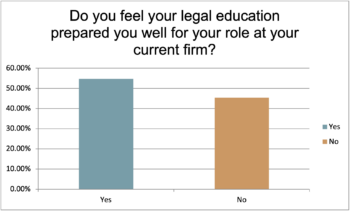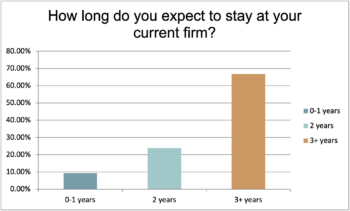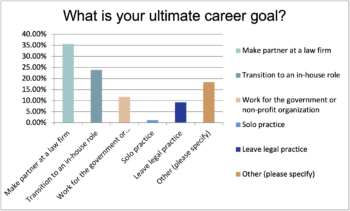At the start of 2024, leading legal intelligence provider Leopard Solutions and legal search firm Major Lindsey & Africa joined efforts to field a first-time survey of newly practicing Generation Z junior associates.
The survey aimed to glean insights into how recent law school graduates are experiencing law firm culture, their long-term aspirations, and the extent to which their education prepared them for law practice. We gained a first-person perspective into the thought processes of these future captains of the legal profession, including what drives them and, more importantly, what they want to see changed.
Who is Gen Z?
McKinsey states, “Generation Z comprises people born between 1996 and 2010. This generation’s identity has been shaped by the digital age, climate anxiety, a shifting financial landscape, and COVID-19.”
For the survey, the field was narrowed to attorneys who received their Juris Doctor (JD) degrees between 2021 and 2023.
Who Participated in the Survey?
The survey was conducted from mid-January to late February and received 546 responses.
Respondents identified as 55% female and 40% male. Participant ethnicities ranged from a majority white (55%) to Asian (11%), Black (9%), and Hispanic (8%). Survey takers were almost unanimously from Am Law 200 firms (92%) and 63% reported being in the workforce only one year or less.
Among participants, the Litigation (39%), M&A (26%), and Financial Services (19%) practice areas had the most representation. Lawyers were almost entirely US-based, though responses were received from nine other countries.
Legal Education Falls Short of Preparing Students for Life as an Associate
When polled if their experience working at the firm matched expectations coming out of law school, almost a third (31%) stated that it did not. Almost half (45%) went as far as to say it did not sufficiently prepare them for their current role. The sentiment was underscored by open-ended comments further shedding light on the disparity between academia and practice.
There was a near consensus that law school was too heavily centered on theoretical concepts and doctrinal analysis, failing to impart practical skills necessary to facilitate a transactional business.
“Law school mainly teaches black-letter law, and practicing law is much more about knowing how to do things. With a legal search engine, I can look up any black letter law I need in four seconds.”
Many also felt it needed to be more balanced toward litigation, with more assistance provided for those pursuing corporate law. “[Law school] did not teach me how to write enough; my drafting is poor, and it suffers. I did very well in law school and feel floundering.”
Guidance on building a book of business and client relations was also absent from the curriculum. “I was not taught how to be a business. Being a lawyer is more managing than it is interpreting the law. Business students are more prepared to be lawyers than law students.”
How would they endeavor to fix the system? A former student said, “Too much time is wasted memorizing useless rules. Doing many things by memory in practice is tantamount to malpractice. The focus should be on the practical, not the theoretical. In the time law school students have wasted learning the rule against perpetuities, we could have solved world hunger fifty times over.”

No Buyer’s Remorse for this Class
A whopping 83% would select the same firm again if given a Mulligan, and 79% reported satisfaction with their assigned work. Perhaps that is attributable to junior associates prioritizing “Culture” (74%) and “Reputation” (67.15%) over “Compensation” (66.15%) in their firm selection process.
A plurality (67%) of respondents plan to stick it out at their jobs for the long haul (3+ years), not surprisingly given the optimism expressed. However, almost a quarter (24%) viewed their role as having a two-year expiration date.
Those not completely enamored with their choices provided some illuminating reasons. For some, it was the time commitment, “this amount of compensation brings with it a lifestyle that I find unsustainable. I do not want to work in an industry that demands me to always be on call no matter what else is happening. The huge compensation benefits do not outweigh that.”
For others, the establishment underwhelmed,” partners are often unreachable and not responsive even when urgent work needs to be completed; partners are not good at managing teams or developing associates.”
Many aired grievances with a culture that prioritizes the billable hour, which was a recurring source of discontent elsewhere across the survey. “I wish I had asked more questions about what the training structure would look like because there is not one, and I am struggling and frustrated every day trying to learn how to be effective in what I do. I want to be excellent, and I do not know if I am in a culture that supports that. I do not know if defense litigation in general fosters and values excellence over billables.”

Driven by Upward Mobility
Over a third (36%) cited the partnership as their top career aspiration. It was followed by pivoting to in-house (24%) or a government/NGO role (12%).
When aggregated, almost three-quarters (71%) wanted to leverage their entry-level BigLaw position to ascend the firm ladder or segue to cushier or more meaningful pastures. Only 10% wished out of the business entirely (9%) or desired to go into business for themselves (1%).
There was no substitute for experience, as 36% of survey-takers expressed a shift in ambitions from law school to law firm. One participant conveyed uncertainty around initial goals due to a lack of transparency, “I am unsure about whether I would want to become Partner – as associates, we receive almost no info as to what this entails daily or how to get clients.”
Another participant believed firm life could be at odds with family goals: “I have begun to wonder whether this position and more senior positions at a large law firm may not necessarily be compatible with my family goals in the future.” One lawyer observed the partnership firsthand and decided he wanted a more balanced life, “seeing the people at the top still pushed around, traveling for work constantly, sick, not happy… what’s the incentive to stick around?”

Job Benefits of Choice Trend Toward More Flexibility
Gen Z associates were not fond of billable hour quotas: fifty-two percent would trade a portion of their salary to reduce them if they could waive a wand and do so. That was 16 percentage points higher than the second most chosen selection associates would swap compensation to gain more.
Reduced workload was a theme as “More time off” (36%) and “Flexible work schedule” (27%), combined, received a 63% share. When posed the question of what changes your firm could make that would be the most meaningful to you, responses ran the gamut from the trivial lack of a “latte machine on my floor” to the geopolitical “stop supporting the genocide in Gaza and stop supporting the occupation of Palestine,” to the interpersonal “People can just be nicer, more professional, stop screaming at people because something went wrong, less passive-aggressive, more pleasant to be around, drink less. Or just let me work from home more so I do not have to bear them.”
The issue of firms needing to ‘rightsize’ due to past overhiring sprees manifested for some in the lack of work to go around, “Partners, seniors, and midlevel treat juniors in this economy poorly. There is a lot of gaslighting from these people and admins – blaming us for not having work and intensely stressing us out for not having work when there is barely enough work to go around. It is clear they over-hired.” One common theme was the lack of respect for personal time, with some citing incongruities in how it was applied,” let me tell people that I am working out in the morning before work hours and would like to have that time respected like people do when employees have children. Why are children the only activity you get a time excuse for?”
Firm Culture Gaps exist, Particularly as Pertains to Racial Diversity, ESG (Environmental, Social and Governance)
Seventy-one percent disagreed or strongly disagreed sexism was prevalent at their firm. Promising the “agree” share was not more significant, considering 56% of survey participants identified as women and the upper rungs of firm administration still very much resemble patriarchy.
Thirty-nine percent disagreed or strongly disagreed that associates at their firm were diverse concerning race. However, text responses did reveal some backlash toward the perceived prioritization of DEI initiatives, calling for “Less focus on DEI initiatives and more focus on merit-based hiring and opportunities.”
More than one in four junior associates disagreed or strongly disagreed firms prioritized pro bono work (27%) or valued social justice and responsibility (27%).
One associate would like to see a return to a firm policy “crediting 200 hours of pro bono towards billables like they used to.”
Mentorship Programs are Widely Available, Nominally Effective
Mentorship programs were available at 84% of firms. Over half (51%) agreed or fully agreed that they have positively impacted their career. Over a fifth (22%) reported being personally selected by a partner for mentorship, though most pairings were random (65%). Some reported being too shy to ask for the help they needed and proposed a pragmatic solution, “Billable credit for mentorship – I hesitate to ask my mentor for too much of her time because I don’t want to take away from her billable matters.’ Some needed it, attesting to “feeling like I’ve been dropped in the deep end often, and would appreciate more support and training.”
Conclusion
Generation Z stands at an exciting nexus during a law firm changing the guard. The first generation to be entirely digital native (millennials had a solid decade of analog living before PCs could be found in every home). They are the most suited to adapting to the AI wave set to transform the industry and receive automation and machine learning less cynically than some of their more wizened peers. Having entered the workforce after the pandemic, they were shaped by remote and hybrid working models, making full-time office reporting anathema to many. This is causing them to butt heads with largely Baby Boomer and Generation X-comprised executive committees, raised on handshakes, pre-DocuSign contracts, and business building more apt to occur in a barroom than a Zoom room.
Despite the differences, senior leaders recognize the skillsets and efficiency-mindedness fresh-faced Z’ers are bringing to the table, as evidenced by entry-level hiring overtaking lateral hiring at Top 200 gross revenue firms for the first time in six years, according to Leopard Solutions data.
As Gen Z grows in the ranks and Boomers phase out, it will be interesting to watch what firm structural changes are implemented. Based on the sentiment like “firm demands of high billables (over 1800) are inhumane and prevent associates from self-reflection or time for legitimate personal and professional development,” we might expect increased alternate fee arrangements, less stringent schedules, and a pivot away from equity compensation models that promote uneven fee sharing, burnout, origination unfairness, and toxic competition. Could this finally be the generation to align law firms with F500-style business practices, favoring mission-driven, collaboration, and client-nurturing to the unending pursuit of profits per partner? Time will tell.
The full survey results will be presented at a co-sponsored breakfast held at the NALP conference in Boston on April 16, 2024.
If you cannot attend the breakfast, consider registering for our webinar on May 7th, during which we will explore the survey responses in greater detail. Register Here.

